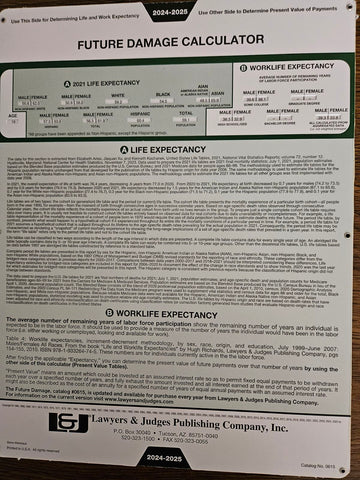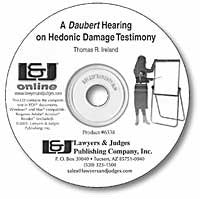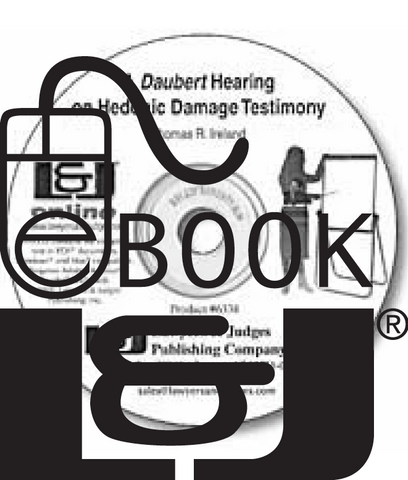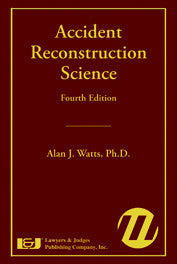
The Longshore Textbook, Sixth Edition PDF eBook
- Compilers: Steven M. Birnbaum Esq., Stephen C. Embry Esq., Ralph R. Lorberbaum Esq. Contributors: Robert E. Babcock Esq., Alan G. Brackett Esq., Thomas C. Fitzhugh, III Esq., Kurt A. Gronau Esq., Frank B. Hugg Esq., Janice Johnson Ulan, Roger A. Levy Esq., Shari S. Militades Esq., Peter D. Quay Esq., Joshua T. Gillelan II Esq, Derek Jacobson Esq., Judge John M. Vittone, Ph.D. Lori R. Cohen, Hon. Nancy S. Dolder, Eric A. Dupree, Kenneth G. Engerrand Esq., Keith L. Flicker Esq., Matthew Garretson Esq., Joshua T. Gillelan II, Esq., Monica F. Markovich Esq., Charles Robinowitz Esq., Michael (Mick) W. Thomas Esq., Hon. John M. Vittone, Ruth Bennett Whitfield Esq.
- Product Code: 0861
- ISBN 10: 1-933264-77-2
- ISBN 13: 978-1-933264-77-6
- Publisher: Lawyers & Judges Publishing Company
- Pages: 449
- PDF eBook
"The Longshore Textbook is an outstanding publication." -- Marine Index Bureau Update, 01/01/1991
"...thoroughly explains employee benefits and rights. No rehabilitation counselor working with Longshore clientele should be without it." -- Winkler Rehabilitation Associates, 05/13/1996
Extensively revised and rewritten, this text is a must for any attorney involved with Longshore and Harbor Workers' compensation claims.
The sixth edition of The Longshore Textbook contains the full text of the Longshore Act, and the applicable portions of the Code of Federal Regulations-to-date as well as analyses of current court decisions and has been expanded with new and revised chapters, making it a must for your reference library. Long recognized as "the single source" reference guide for attorneys, adjusters, physicians, vocational counselors, and insurance professionals, this newly revised sixth edition is the most complete publication of its kind.
Experts in law, medicine and administration present an easy-to-read explanation of the Longshore Act. You will appreciate the clear concise manner in which the Act is evaluated and examined, supplying you with careful presentations of court decisions affecting its application. Legal decisions, statutes and regulations are liberally cited throughout. Its treatment includes issues such as disability, occupational disease, coverage, benefits, vocational rehabilitation, employer’s liability, ethical considerations, third party provisions, Medicare and more. Practical questions are also addressed: file administration, administrative procedures, calculating wages, trial practice, appeals before the Benefits Review Board, jurisdictional issues, and more.
Supplementing the substantive materials are the texts of the Longshore Act, the applicable portions of the Code of Federal Regulations, interest and benefit tables, samples of commonly used forms, and a current directory of Department of Labor Longshore offices.
Thousands of professionals use the previous editions of The Longshore Textbook. This newly revised sixth edition, the most complete single source publication yet, should be part of your professional library.
TOPICS COVERED
- Full text of the Longshore Act, and the applicable portions of the Code of Federal Regulations
- Administrative claims handling
- AMA disability guidelines
- BRB appeals and operation of the BRB Claims administration for nonappropriated fund employees
- Coverage boundaries
- Defense Base Act: Jurisdictional considerations
- Death benefits
- Disability
- Occupational disease
- Retained wage earning capacity
- Employer considerations
- Employer's liability
- Fees for services
- Interest and penalties
- Medical benefits and treatment
- Medicare issues
- Vocational rehabilitation
- Modification of awards
- Notice of injury and the statute of limitations
- Practice before Administrative Law Judges
- Presumptions
- Settlements
- Calculation of wages
- Third-party provisions
- Vessel and vessel owner considerations
Table of Contents
Chapter 1. Administrative Claims Handling at the District Director’s Office
Thomas C. Fitzhugh III, Esq.
1.1 Introduction
1.2 Claims Management
1.3 Medical Management
1.4 Settlements
1.5 Attorney’s Fees
1.6 Penalties
1.7 Special Fund (8(f))
1.8 Rehabilitation
1.9 Death Claims
1.10 Clerical
Chapter 2. Concurrent Jurisdiction
Kenneth G. Engerrand, Esq.
2.1 Summary
2.2 Statutory Bases
2.3 Introduction
2.4 LHWCA and State Workers’ Compensation Acts
2.5 LHWCA and Jones Act
2.6 Other Remedies
2.7 Conclusion
Endnotes
Chapter 3. Limiting Employers’ Liability
Michael “Mick” W. Thomas, Esq.
3.1 Introduction
3.2 Credit for Payments Received by Claimant from Prior Awards, Alternate Sources, and Advance Payment under the Act
3.3 Credit for Workers’ Compensation and Jones Act Benefits
3.4 Credit for Advance Payments of Compensation
3.5 Independent Credit Doctrine
3.6 Credit for Third-Party Lawsuit Recoveries
3.7 Section 8(f). Limitation of Liability
3.8 New Injury
3.9 Pre-Existing Permanent Partial Disability
3.10 Manifest to the Employer Before the New Injury
3.11 Disability Not Due Solely to the New Injury
3.12 Disability is Materially and Substantially Greater: The Contribution Element
3.13 Procedural Pitfalls and the Catch
Endnotes
Chapter 4. Price and the Bright, Fuzzy Line of Traumatic Two-Injury and Cumulative Orthopedic Claims
Frank B. Hugg, Esq.
4.1 The Price Rule Restated: The Last Employer Buys the Farm?
4.2 The Origins and Development of the Two-Employer Rule
4.3 Price Two-Employer Rule Applied
4.4 Post-Price:The Ninth, Other Circuits, and the Board
4.5 Conclusion: Price—The New is Old Rule For Evidence
Chapter 5. Medical Treatment
Ralph R. Lorberbaum, Esq.
Chapter 6. Disability
Alan G. Brackett, Esq.
6.1 Temporary Total
6.2 Temporary Partial
6.3 Permanent Partial
6.4 Permanent Total
6.5 Conclusion
Endnotes
Chapter 7. Toward a Better Understanding of the Psychiatric and Co-Morbid Longshore Claim
Lori R. Cohen, Ph.D.
7.1 Information from Treating Physicians
7.2 Relevant Questions
7.3 Psychiatric Considerations
7.4 Conferring with the Mental Health Treatment Provider
7.5 Non-Mental-Health Treatment Provider Referrals to Psychologists
7.6 Independent Psychiatric Examinations
7.7 Monitoring the Psychiatric Claim
7.8 Conclusions
Chapter 8. Occupational Diseases
Stephen C. Embry, Esq.
8.1 Last Employer
8.2 Statute of Limitations
8.3 Statute of Limitations for Retirees
8.4 Statute of Limitations for Dependents
8.5 Average Weekly Wage
8.6 Section 33
Endnotes
Chapter 9. Calculation of the Average Weekly Wage Under the Defense Base Act
Monica F. Markovich, Esq.
9.1 Section 10(a)
9.2 Section 10(b)
9.3 Section 10(c)
9.4 DBA Indemnity Benefits: Trends But Still No Consensus
Acknowledgments
Endnotes
Chapter 10. Employer Considerations
Shari Sigman Miltiades, Esq.
Chapter 11. Interest and Penalties
Peter D. Quay, Esq.
11.1 Interest
11.2 Penalties and Payments Without an Award
11.3 Penalties Under an Order or Award
11.4 Some Examples of the Principles Discussed
A. Characters
B. Injury One
C. Injury Two
D. Injury Three
11.5 Attorney Fees
11.6 Medical Benefits
11.7 Penalty, During Modification Proceedings
11.8 Other Penalties
Chapter 12. Third-Party Provisions
Roger A. Levy, Esq.
12.1 Employer’s Right to Credit: Section 33(f)
12.2 Employee’s Duty to the Employer: Section 33(g)
A. The Cowart Decision
1. Application of the court’s decision to LHWCA cases
2. Retroactivity and res judicata
B. The Yates and Taylor Decisions: An Exception to Cowart
12.3 Section 8(i): Settlement Agreements in Third-Party Claims
A. When Is a Settlement Not a Settlement?
Chapter 13. Practice before the Office of Administrative Law Judges
Judge John M. Vittone
13.1 Introduction: General Background Information
13.2 Implementing Authority and Creation of the Office of Administrative Law Judges
13.3 The Claim Process
13.4 Subpoenas
13.5 The Transfer of Claims to the OALJ
13.6 General Powers of the ALJ
13.7 The OALJ Hearing Process
13.8 Setting Hearings
13.9 Alternative Dispute Resolution
13.10 Section 8(i). Settlement Of Claims
13.11 Pretrial Orders
13.12 Evidence and Witnesses
13.13 Conduct of the Hearing
13.14 Motions for Reconsideration
13.15 Resources
13.16 Closing
Chapter 14. NAFI Workers’ Compensation Practice
Ruth Bennett Whitfield, Esq.
14.1 Employer/Employee
14.2 Exclusive Remedy
14.3 Average Weekly Wage
14.4 Anti-Alienation of Benefits
14.5 Appellate Jurisdiction
14.6 Representation
Endnotes
Chapter 15. Appellate Procedure under the Longshore Act
Joshua T. Gillelan II, Esq.
15.1 Basic Appellate Framework
15.2 Reviewable Decisions
A. District Directors’ Decisions
B. ALJs’ Decisions
C. Benefits Review Board Decisions
15.3 Stays of Payment Pending Review
15.4 Scope of Review
A. Factual Disputes
B. Questions of Law
15.5 Notice of Appeal to Board
A. Form and Contents
B. Timeliness
15.6 Briefing
15.7 Oral Argument
15.8 Decision and Reconsideration
15.9 Attorney Fees
15.10 Petition for Review to the Court of Appeals
A. Form and Contents
B. Timeliness
15.11 Briefing
15.12 Oral Argument
15.13 Decision, Reconsideration, and Mandate
Endnotes
Chapter 16. Filing an Appeal and Operation of the Benefits Review Board
Judge Nancy S. Dolder and Janice J. Ulan
16.1 In General
16.2 Timely Appeal
16.3 Notice of Appeal
16.4 Proper Party
16.5 Final Decision
16.6 Invoking Board Review
16.7 Scope of Review
16.8 Stay of Payments
16.9 Miscellaneous
Endnotes
Chapter 17. Modification: Still the Ultimate Post-Trial Remedy
Robert E. Babcock, Esq.
Chapter 18. Ethical Considerations in Longshore Practice
Keith L. Flicker, Esq.
Chapter 19. Medicare Liens—The Basics of the Medicare Secondary Provider (MSP) Statute
Matthew Garretson, Esq.
19.1 The Rules Have Changed
19.2 Medicare Part C
19.3 Medicare Part D
A. Recommendation
19.4 A Step-by-Step Process Map for Handling Medicare Reimbursement Claims
A. Getting Started
B. Resolution Process
1. Verification
2. Case initiation
3. Assignment of case to MSPRC
4. Requesting a determination
5. MSPRC
6. Dealing with delays
7. Conditional payment summary
8. Disputing unrelated claims
9. Case follow up
10. Request final demand
11. Procurement cost offset
12. Final recovery determination letter and payment of lien
13. Other distributions
14. Release of future claims
19.5 Medicare Liens: Appeals and Requests for Reduction or Waiver of Medicare’s Claim
A. Level 1—Waiver or Compromise
B. Level 2—Reconsideration
C. Level 3—Administrative Law Judge (“ALJ”)
19.6 Medicare Liens—Recovery from the Estate of a Deceased Beneficiary
19.7 A Case Study—Ohio
19.8 Medicare Liens: Multiple Party Settlement Checks
19.9 Medicare Set-Aside Arrangements (“MSAs”)
A. MSA Overview
B. Medicare’s Recovery Rights (the law)
C. Longshoreman Act Settlements (and MSAs)
D. Commutation versus Compromise
E. Settlements Entered Into Prior to the July 23, 2001 ARA Letter Concerning Commutation of Future Benefits
F. CMS Review Threshold for Longshoreman Act Cases
G. Computing the Total Settlement Amount
H. Who Has a “Reasonable Expectation” of Medicare Enrollment Within 30 Months of Settlement?
I. When is an MSA Not Recommended?
J. The Submission Process
K. Settlement of Medical Expenses Prior to Submission to CMS
L. Who to Contact
M. Professional Administration versus Self-Administration of MSAs
N. Administrative Fees or Expenses and Attorney Costs
O. Treatment of Taxable Interest Income Earned on an MSA
P. Death of a Claimant Prior to Exhaustion of the MSA Proceeds
Q. Transfer Mechanism for Items and Services Not Covered by Medicare
R. No Medicare Payments for a Claimant’s Injury-Related Care until MSA is Exhausted
S. No Compromise for Future Medical Expenses
T. No Waiver of Specific Services Related to a Longshoreman Act Case
U. Longshoreman Act Claims Not Covered in the Settlement
V. Loss of Medicare Entitlement After CMS Approval of the MSA
W. Effect of MSA on Medicaid Eligibility
X. Use of MSA Funds Prior to Medicare Entitlement
Y. MSAs in Cases Where There Are Both Longshoreman Act Claims and Third Party Liability Claims
19.10 The Medicare, Medicaid, and SCHIP Extension Act of 2007
A. Who Will Have To Report?
1. Insurer
2. No-fault insurance
3. Liability self-insurance
4. Workers’ compensation law or applicable plans
B. Can Agents Report on Behalf of RREs?
C. What Triggers a Reporting Obligation for Non-GHPs?
D. What Are the Reporting Rules?
1. General reporting requirements
2. A reporting timeline
3. File submission steps and timing issues
4. The need for SSNs and HICNs in the Section 111 reporting process
E. How Will Medicare Use this Information?
1. MMSEA does not equal MSAs
F. Changing Habits
G. Issues for Plaintiffs’ Counsel
H. Neutral Assistance for the Parties
19.11 Conclusion
Endnotes
Chapter 20. Jurisdictional and Coverage Considerations under the Defense Base Act
Kurt A. Gronau, Esq.
Chapter 21. Attorney Fees
Eric A. Dupree, Esq., Charles Robinowitz, Esq. and Joshua T. Gillelan II, Esq.
21.1 Conditions for Employer Fee Liability
21.2 Application
21.3 Amount of Fees and Expenses Recoverable
A. Hourly Rates
B. Compensable Services
C. Recoverable Expenses
21.4 Appellate Review
Endnotes
Appendix A. Longshore and Harbor Workers’ Compensation Act and its Extensions
Appendix B. Code of Federal Regulations
About the Editors
About the Contributors
Index




